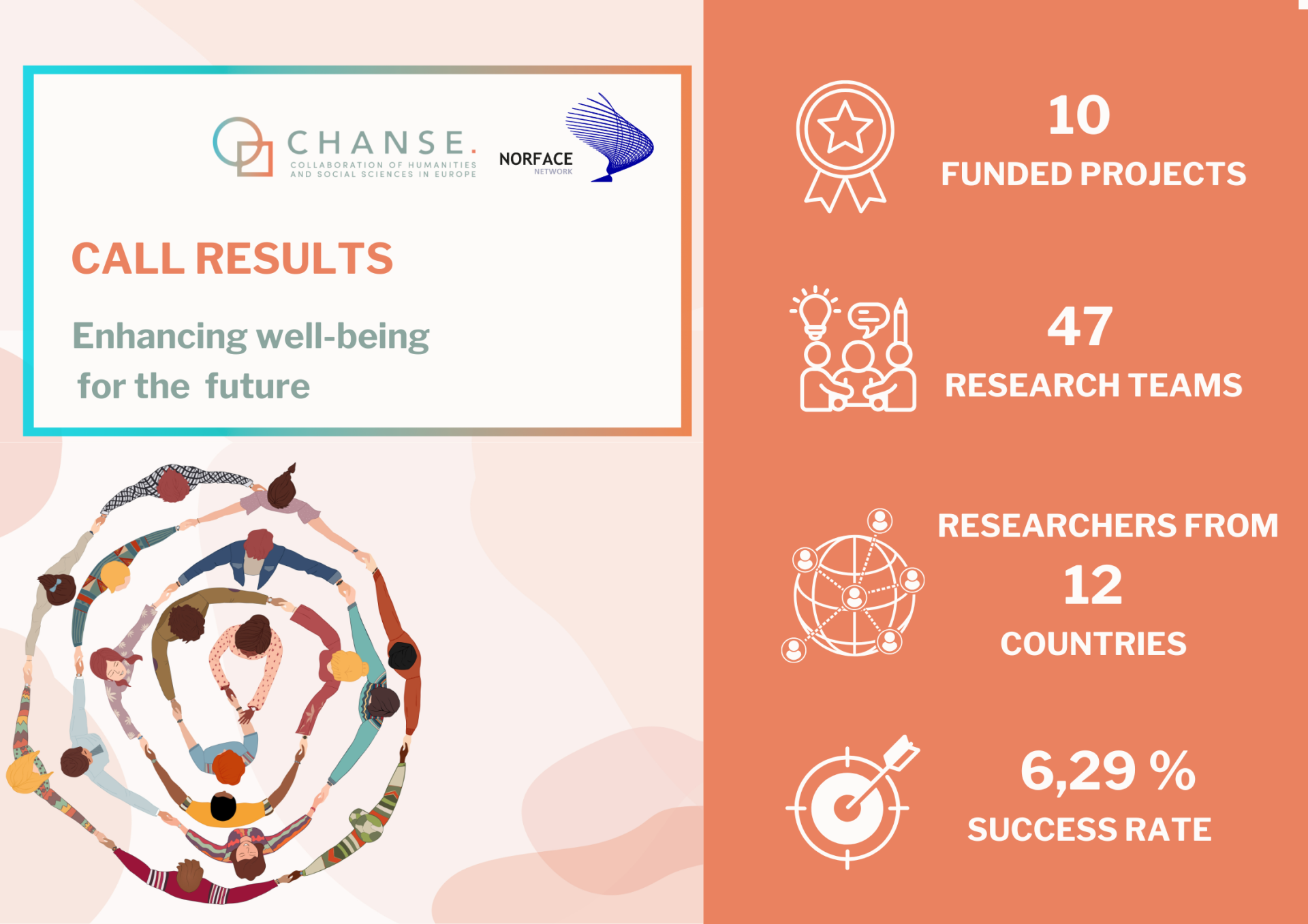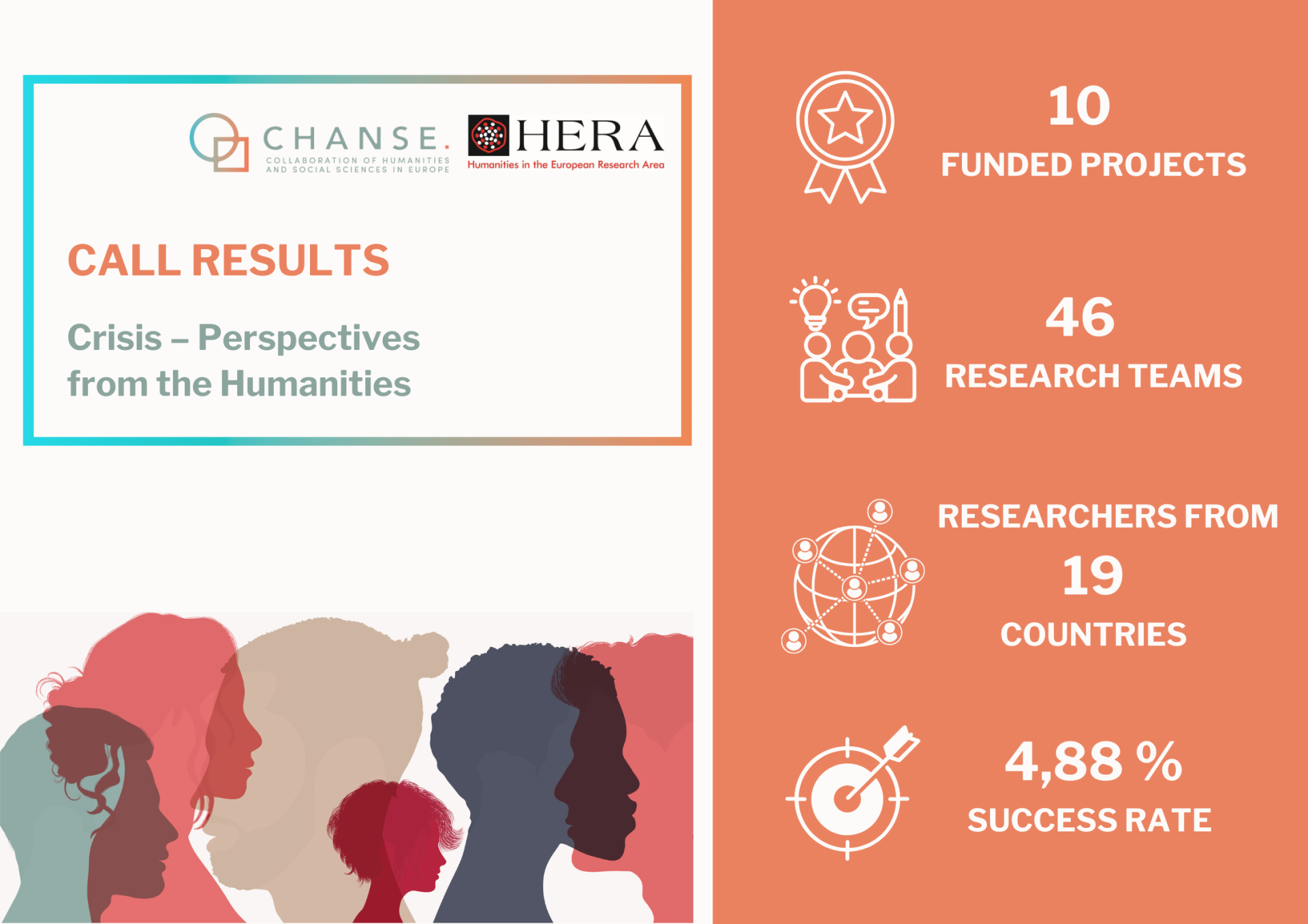Six Polish research teams will be funded under CHANSE: Crisis and Well-being calls, organized under the CHANSE programme in cooperation with the HERA and NORFACE networks. Polish researchers will study, inter alia, religious reactions to (geo)political crisis, women’s well-being in digital space and microsimulation models on well-being in various aspects of life.
CHANSE (Collaboration of Humanities and Social Sciences in Europe) is one of two ERA-NET-type international programme coordinated by the National Science Centre that brings together 27 research funding agencies from 24 European countries. It was created to respond to contemporary social and cultural challenges. The first call: Transformations: Social and cultural dynamics in the digital age, launched in 2021, attracted a lot of interest from the scientific environment. Therefore, two years later, two other calls in Arts, Humanities and Social Sciences were launched:
- Enhancing Well-being for the Future, organised jointly by CHANSE and NORFACE
- Crisis – Perspectives from the Humanities, organised jointly by CHANSE and HERA
 The two calls were open to international consortia comprising 4 to 6 research teams from at least 4 countries participating in a call. 159 projects ware submitted to the Well-being call at the first stage of submission and 205 projects were submitted to the Crisis call. Following a two-stage evaluation procedure performed by international experts, 36 projects were recommended for funding in each call. By the decision of the Calls Boards, including national research funding agencies, 10 projects were recommended for funding under Enhancing Well-being for the Future, including 4 involving Polish research teams. 10 projects will be funded under Crisis – Perspectives from the Humanities, including 2 involving Polish research institutions. The winning projects will be performed by 93 research teams from 21 countries. The themes of the projects submitted to the Well-being call focus on social well-being in the light of ongoing transformations. The winning projects include WELLMOD, a project aimed to create a micro-simulation model to enhance wellbeing for the future. The Polish research team headed by Dr Anna Gromada from the Institute of Philosophy and Sociology, Polish Academy of Sciences, together with partners from France, Luxembourg and United Kingdom, will try to develop a tool allowing to better analyse an impact of policies on social wellbeing aiming to maximise it in view of the budget constraints. WELLSIM is yet another winning project submitted by an international consortium of researchers from Spain, Germany, Poland, Sweden and United Kingdom who will analyse the relationship between wellbeing of an individual and many aspects of life, such as work, health and family, to create basis for integrating wellbeing measures into a modern microsimulation model. The Polish research team will be headed by Dr Michał Brzeziński from the University of Warsaw.
The two calls were open to international consortia comprising 4 to 6 research teams from at least 4 countries participating in a call. 159 projects ware submitted to the Well-being call at the first stage of submission and 205 projects were submitted to the Crisis call. Following a two-stage evaluation procedure performed by international experts, 36 projects were recommended for funding in each call. By the decision of the Calls Boards, including national research funding agencies, 10 projects were recommended for funding under Enhancing Well-being for the Future, including 4 involving Polish research teams. 10 projects will be funded under Crisis – Perspectives from the Humanities, including 2 involving Polish research institutions. The winning projects will be performed by 93 research teams from 21 countries. The themes of the projects submitted to the Well-being call focus on social well-being in the light of ongoing transformations. The winning projects include WELLMOD, a project aimed to create a micro-simulation model to enhance wellbeing for the future. The Polish research team headed by Dr Anna Gromada from the Institute of Philosophy and Sociology, Polish Academy of Sciences, together with partners from France, Luxembourg and United Kingdom, will try to develop a tool allowing to better analyse an impact of policies on social wellbeing aiming to maximise it in view of the budget constraints. WELLSIM is yet another winning project submitted by an international consortium of researchers from Spain, Germany, Poland, Sweden and United Kingdom who will analyse the relationship between wellbeing of an individual and many aspects of life, such as work, health and family, to create basis for integrating wellbeing measures into a modern microsimulation model. The Polish research team will be headed by Dr Michał Brzeziński from the University of Warsaw.
 Under the Crisis call, the winning projects will research social changes in view of geopolitical crises and technological transformations. RELIDEM is a wining project focusing on the analysis of relationship between political crises and the role of religion especially in the light of growing nationalism and populism. Dr hab. Katarzyna Zielińska from the Jagiellonian University will be in charge of the project part in Poland. Another winning project NIHAI will analyse disinformation and communication crises resulting from the growing use of artificial intelligence. The aim of the research is to understand communication norms, their violation and factors that influence human trust in AI. Research results will then be used to develop principles for the responsible design and use of AI technologies. The Polish research team will be headed by Dr Izabela Skoczeń from the Jagiellonian University.
Under the Crisis call, the winning projects will research social changes in view of geopolitical crises and technological transformations. RELIDEM is a wining project focusing on the analysis of relationship between political crises and the role of religion especially in the light of growing nationalism and populism. Dr hab. Katarzyna Zielińska from the Jagiellonian University will be in charge of the project part in Poland. Another winning project NIHAI will analyse disinformation and communication crises resulting from the growing use of artificial intelligence. The aim of the research is to understand communication norms, their violation and factors that influence human trust in AI. Research results will then be used to develop principles for the responsible design and use of AI technologies. The Polish research team will be headed by Dr Izabela Skoczeń from the Jagiellonian University.
“The Crisis and Well-being calls attracted a lot of attention from researchers in Arts, Humanities and Social Sciences. Polish researchers were among the majority of applicants amid countries participating in the call. As you can see, there is a lot of interest in international cooperation in Arts, Humanities and Social Sciences among the Polish research community. You could also see it in the earlier calls launched by CHANSE as well as HERA and NORFACE. The themes of the winning projects submitted to the Crisis and Well-being calls are particularly important in view of challenges facing the Polish and European society, such as psychological health, women’s wellbeing and development of artificial intelligence,” says Dr Malwina Gębalska, CHANSE programme coordinator.
A list of winning NCN-funded projects involving Polish researchers:
Enhancing Well-being for the Future
- LGBTI_FUTURES: LGBTI+ youth well-being across Europe: Imagined futures in turbulent times.
- Principal investigator of the Polish research team: Dr Justyna Struzik from the Jagiellonian University
- The project will be carried out with partners from Estonia, Switzerland, Sweden and United Kingdom
- WELLMOD: A Wellbeing Micro-Simulation Model to Enhance Wellbeing for the Future
- Principal investigator of the Polish research team: Dr Anna Gromada from the from the Institute of Philosophy and Sociology, Polish Academy of Sciences
- The project will be carried out with partners from France, Luxembourg and United Kingdom
- WELLSIM: A life course microsimulation perspective on multi-dimensional well-being for five European countries.
- Principal investigator of the Polish research team: Dr hab. Michał Brzeziński from the University of Warsaw
- The project will be carried out with partners from Germany, Spain, Sweden and United Kingdom
- WOW: Women's Online Wellbeing: a European Examination of digitalised violence against women.
- Principal investigator of the Polish research team: Dr hab. Witold Klaus from the Institute of Law Studies of the Polish Academy of Sciences
- The project will be carried out with partners from Spain, Sweden and United Kingdom
Crisis – Perspectives from the Humanities
- NIHAI: Norms in language-based Human-AI Interaction
- Principal investigator of the Polish research team: Dr Izabela Skoczeń from the Jagiellonian University
- The project will be carried out with partners from Austria, Romania and Switzerland
- RELIDEM: Religious Realignments and Democratic Resilience: A Comparative Study of Religious Responses to (geo)political Crises
- Principal investigator of the Polish research team: Dr hab. Katarzyna Zielińska from the Jagiellonian University
- The project will be carried out with partners from Finland, Lithuania and Sweden
A list of winning projects in the following calls:
Crisis – Perspectives from the Humanities, .PDF
Enhancing Well-being for the Future, .PDF
CHANSE Call 2023 ranking list, .PDF
Follow the news on the CHANSE website where you can also find information on project funding.
Contact details: chanse@ncn.gov.pl
